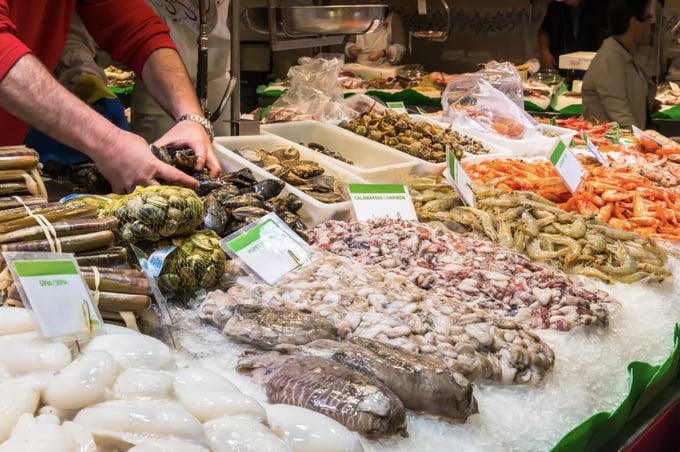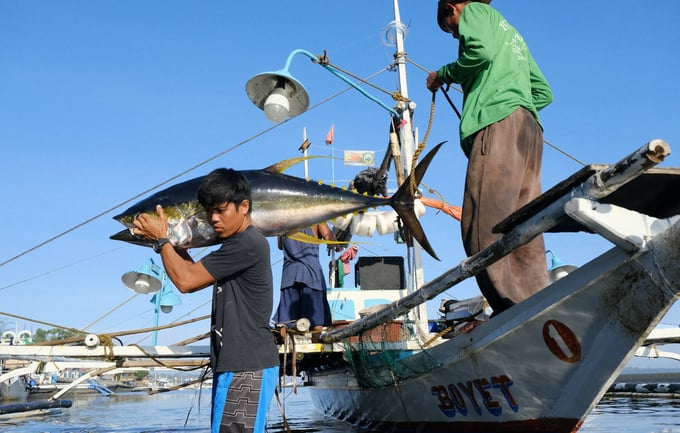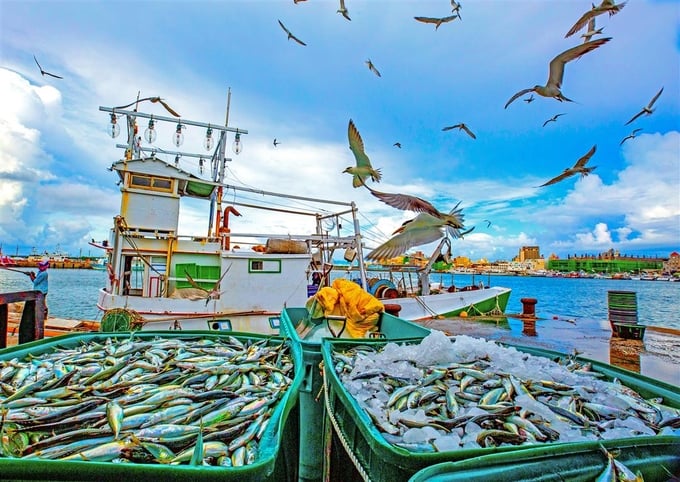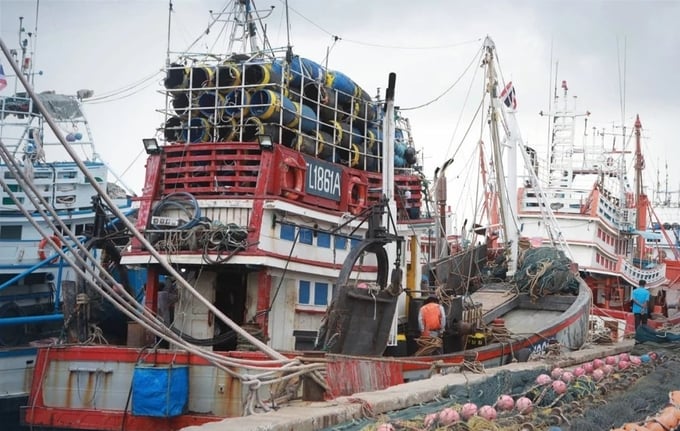June 17, 2025 | 00:01 GMT +7
June 17, 2025 | 00:01 GMT +7
Hotline: 0913.378.918
June 17, 2025 | 00:01 GMT +7
Hotline: 0913.378.918
The European Union (EU) is the world’s largest market for seafood products, importing around 60% of its overall consumption. However, the quantity of illegal seafood products imported into the EU each year is estimated at 500,000 tonnes, worth some €1.1 billion. To combat this issue, in 2008 the EU enacted what is arguably the world’s most stringent legislation preventing illegally caught fish from entering its market.
The EU Regulation to end illegal, unreported and unregulated (IUU) fishing came into force January 1st, 2010, requires countries which export fish to the EU or lend their flags to vessels that import into the EU meet strict standards for fisheries management. If these standards are not met, the countries may be “carded”, which means that they could ultimately face exclusion of their fish from the EU market.

EU is the world’s largest market for seafood products. Photo: Ekaterina Belova.
The IUU Regulation (1005/2008) is the core of the EU’s legal framework for action against global IUU fishing. Its primary objective is to prevent, deter and eliminate the trade of IUU-caught products into the EU. One of its key components is a multiple-step procedure for dealing with non-EU countries considered uncooperative in the fight against IUU fishing.
The European Commission identifies non-EU countries that fail to discharge their duties under international law to take action against IUU fishing, and initiates dialogue with each of them. If the dialogue does not resolve the shortcomings, the Commission notifies the country of the risk of being identified as non-cooperating. This notification is known as “pre-identification”, or a “yellow card”. The Commission proposes tailored measures, which the non-EU country is expected to address by a specified deadline. If the pre-identified country makes progress in line with the proposed measures but more time is needed to conclude the reforms, the yellow card status may be extended.
In cases where the pre-identified country fails to resolve its IUU fishing problems, the Commission identifies it as a non-cooperating country, in what is called the “identification” step, or the “red card”, and proposes to the Council to place the country on the list of non-cooperating countries, i.e. the “listing” step. Listing involves trade-restrictive measures - the prohibition of imports of fishery products from the listed country, associated with a prohibition on EU vessels operating in its waters.
The annual global output of IUU fishing is estimated at 11 - 26 million tons, worth 10 - 20 billion euros. This poses serious threats to the sustainable use of marine resources and biological diversity. Since then, the fight against IUU fishing has become an important goal in the sustainable use of marine resources.
Dialogue remains open throughout the procedure. When a pre-identified, identified or listed country makes concrete progress in resolving EU concerns, the Commission lifts the pre-identification status or proposes to the Council to delist the country, i.e. it gives the “green card”.
A total of 27 countries have been given a yellow card under the IUU Regulation (up to May 2022), including Belize, Campuchia, Cameroon, Comoros, Curacao, Ecuador, Fiji, Ghana, Kiribati, Korea, Liberia, Panama, Papua New Guinea, Philippines, Guinea, Siera Leone, Solomon Islands, Sri Lanka, Saint Kitts and Nevis, Saint Vincent and Grenadines, Taiwan, Thailand, Togo, Trinidad and Tobago, Tuvalu, Vanuatu, and Vietnam.
Fourteen of them had their pre-identification lifted, after varying periods between 10 and 56 months, but two countries subsequently received a second yellow card.
For six of the pre-identified countries, the procedure continued with a red card and listing, of which three countries were delisted after 13, 20 and 35 months respectively. Currently nine countries have a yellow card and three have a red card.
In November 2013 and June 2014, the EU issued warnings (yellow cards) to South Korea and the Philippines respectively, for their continued failure to comply with international obligations to fight illegal fishing and to improve their fisheries management and control.
In less than two years since dialogue with the Commission began, South Korea and the Philippines have developed new fisheries legislation, improved their inspection set-ups and upgraded their traceability systems in line with international law.

The Philippines has also implemented many measures to prevent and combat IUU fishing. Photo: David David.
South Korea carried out a broad revision of the legal framework governing its long-distance fleet in line with international requirements and has updated its National Plan of Action on IUU fishing (NPOA-IUU).
Joined the International Monitoring, Control and Surveillance (MCS) Network for Fisheries-related Activities, intensified cooperation with third countries and NGOs in the fight against IUU fishing activities, and introduced and applied much higher sanctions for vessels found to fish illegally.
Established a Fisheries Monitoring Centre (FMC) that controls in near real-time its fleet in all oceans, and installed a vessel monitoring system (VMS) on board all South Korean-flagged distant water fishing vessels (approximately 300 vessels).
Put in place procedures to guarantee a more reliable catch certification scheme. For instance, as from September 2015 all vessels will be fitted with an electronic logbook system, which will allow them to share real-time information on catch and fishing operations and initiated the process to ratify the FAO Port State Measures Agreement.
The Philippines, since their yellow card was issued, has strengthened its commitment to fighting IUU fishing on the international level, ratifying the UN Fish Stocks Agreement (UNFSA) and initiating procedures to ratify the Port States Measures Agreement.
Besides this, Philippines carried out extensive reforms of its legal framework, put in place domestic legislation to implement RFMO conservation and management measures, and introduced new measures to target the activities of its long distance fleet, including a stronger sanctioning scheme for IUU-related infringements.
Adopted new traceability rules to ensure control over fish products along the supply chain, as well as standard operating procedures for the comprehensive cross-checking and certification of information contained in EU catch certificates before validation.
Ensured that more than 200 Philippine fishing vessels operating in areas regulated by the WCPFC, IOTC and ICCAT RFMOs, as well as national and foreign vessels fishing in Philippine waters, now have real-time VMS coverage. A fully fledged FMC has also been established in Manila.
Established an electronic licensing system, and increased the human, technical and financial resources available for fisheries administration, including the progressive recruitment of new officials allocated to inspection activities and implementation of the catch certification scheme, plus increased budget for the fisheries department.
Moreover, Philippines also improved cooperation with neighboring countries in the fight against IUU fishing, in particular with Papua New Guinea, making arrangements to share information on landings and transhipment and to coordinate practices which improve traceability and catch certification procedures.
As a result of all these actions, South Korea and the Philippines had their yellow cards lifted in April 2015.
According to the statistics from Taiwan Department of Fisheries, Taiwan is on the list of the top 20 fishing countries in the world, and is one of the 6 countries with the most seafood exploitation activities in international waters in the world. Taiwan leads the world in saury caught in the North Pacific Ocean and albacore tuna caught in the Indian Ocean and the South Atlantic.
Taiwan’s distant water fishing fleets are among the top three largest distant water fleets. Its long line fishing industry operates in three major oceans and produces an annual output of 280,000 metric tons is the largest global long line fleet.
Thanks to increased worldwide environmental awareness, the large capacity of Taiwan's distant water fishing fleet has become a major concern for many Regional Fisheries Management Organizations (RFMOs) and environmental non-governmental Organizations (NGOs). Although RFMOs and NGOs had criticized illegal fishing activities conducted by Taiwanese vessels and urged the government of Taiwan to take relevant actions, the government failed to address the problem.

Taiwan has put great efforts to strengthen its fisheries management on four aspects, specifically the legal framework, MCS, traceability and international cooperation. Photo: Taiwan-panorama.
Taiwan’s lack of response led the European Commission under its IUU regulations to issue a “yellow card” a warning that the country at the time was not sufficiently tackling IUU fishing. Failure to be delisted from yellow-card status could lead to a complete import ban of marine corps products into the EU.
As a result of intense cooperation and dialogue between the Commission and Taiwan after the issuance of the yellow card in October 2015.
After being warned by the European Commission as a possible non-cooperating country in October 2015, Taiwan has put great efforts to strengthen its fisheries management on four aspects, specifically the legal framework, MCS, traceability and international cooperation.
Legal frameworks, the “three fisheries acts” were adopted, namely the Act for Distant Water Fisheries, the amended Act to Govern Investment in the Operation of Foreign Flag Fishing Vessels, and the amended Fisheries Act. In addition, under the authorization of the legislation, several implementing regulations and notices were drawn up, and came into force together with the three fisheries acts in January 2017. The legal basis governing Taiwan’s distant water fisheries is thus reinforced.
Series of actions were taken to strengthen management scheme. For example, all distant water fishing vessels are installed with the electronic logbook (e-logbook) system. A Fisheries Monitoring Center (FMC) that runs 24/7 is established to grasp the movement of Taiwan’s distant water fishing fleets. Landing declaration scheme is implemented. 32 foreign ports are designated where Taiwanese distant water fishing vessels are allowed to land or transship only at those ports.
Regarding traceability, the Strategy Plan for Auditing Industry Related to Distant Water Fisheries was drafted and implemented, whereby auditing and guiding exporters to ensure the fisheries products purchased are not involved in IUU fishing.
Cooperation arrangements with 22 countries with high relevance with Taiwan in terms of fisheries were concluded. Taiwan’s image in the international society are enhanced by improving the compliance record within the regional fisheries management organizations (RFMOs).
Furthermore, to successfully execute abovementioned measures, the Executive Yuan set up a Cross-Ministerial Task Force on Combating IUU Fishing, to integrate and coordinate the capacities of relevant authorities, such as the Ministry of Foreign Affairs, Ministry of Justice, Ministry of Economic Affairs, Ministry of Finance, Ministry of Health and Welfare, Council of Ocean Affairs, Ministry of Labor, and Council of Agriculture.
With the establishment of such Task Force, Taiwan’s National Plan of Control and Inspection for Fisheries (NPCI) are carried out smoothly on all fronts, ranging from vessel safety, enforcement at sea, hygiene inspection, control of import and export, and deterrence of IUU fishing.
With years of hard work and constructive dialogues with the EC, the EC resolves on 27 June to lift the yellow card. It is also agreed to establish a Working Group on Combating Illegal, Unreported and Unregulated (IUU) Fishing between Taiwan and the EC, so as to deepen the collaboration in this regard and to ensure the legitimacy and traceability of fisheries products.
Karmenu Vella, Commissioner for Environment, Maritime Affairs and Fisheries said: “I welcome the considerable efforts undertaken by Taiwan to reform its fisheries legal framework, implement new control tools and improve the traceability of marine fisheries products. The EU’s dialogue with Taiwan has shown again that international cooperation is a key driver towards healthier ocean management”.
Immediately after the “yellow card” was lifted by the EC,Taiwan joined the South Indian Ocean Fisheries Agreement as a “Cooperative Fishing Entity” on July 4st, 2019.
In the past, fisheries had been undertaken in Thailand under an “open access” system, with fisheries law that had never been updated with current situation, while the law enforcement was also weak. Since the yellow card was issued April 2015, Thailand has begun a fundamental reform of its fisheries sector, seeing it as an opportunity to rebuild its image with many new laws, policies and programs in line with international commitments.
Thailand has amended its fisheries legal framework in line with international law of the sea instruments. It has reinforced compliance with its obligations as a flag, port, coastal and market State, included clear definitions in its legislation and set up a deterrent regime of sanctions.
Moreover, it has reinforced the mechanisms of control of the national fishing fleet and enhanced its MSC. As a result, Thailand has made significant progress in introducing a comprehensive regulatory pain code to enable control and enforcement of MCS activities through an FCM established in 2016.

On January 8th, 2019, The European Commission delists Thailand from the group of “warned countries” as recognition of its progress in tackling illegal, unreported and unregulated fishing. Photo: Nationthailand.
Thailand's FCM is equipped with advanced information technology systems to enable surveillance at ports, at sea and in the air. Currently, all fishing vessels in this country have VMS systems installed. From the center, the authorities will know exactly where the fishing vessels are fishing, whether they are in Thailand's territorial waters or in areas where fishing is prohibited.
With just a smartphone, ship owners can register import and export procedures for their family's fishing vessels. With different applications, ship owners will know which area their ship is operating in as well as look up the ship's operating history in the past 10 days. If a ship is detected leaving Thai waters, ship owners will contact the captain to request the ship to return.
Since the EU gave Thailand an IUU yellow card warning in 2015, Thailand has developed a vigorous transformation project. The Thai government has allocated more than €87 million to combat illegal fishing and to overhaul the way we govern and work with our fisheries industries.
Thailand plays a central role in the international supply chain for fisheries products. The highly developed Thai processing industry relies on raw materials from the Indian and Pacific Oceans. As party to the United Nations' Food and Agriculture Organization Port States Measures Agreement, Thailand has reinforced controls over landings of foreign fishing vessels in Thai ports and strengthened cooperation with flag States in the Indian and Pacific Oceans. The reinforcement of the fisheries legal and administrative systems in Thailand could therefore trigger a multiplier effect in the global sustainability of fisheries resources.
The Commission also recognises the efforts demonstrated by Thailand to tackle human trafficking and to improve labour conditions in the fishing sector. While not part of the bilateral dialogue on IUU fishing, the Commission and the European External Action Service have addressed with Thai authorities the serious human rights abuses and forced labour in the fishing industry. Thailand has recently announced the ratification of the International Labour Organisation's Convention No. 188 on Work in Fishing (C188), the first country in Asia to do so.
As the EU's fifth largest seafood trading partner with a trade value of 426 million euros in 2016, Thailand had done its part to tackle the dangerous global problem of IUU. The Southeast Asian nation is reforming and modernizing its seafood industry and building a strong new legal and policy framework to ensure a sustainable, ethical and more environmentally and socially friendly.
On January 8th, 2019, The European Commission delists Thailand from the group of “warned countries” as recognition of its progress in tackling illegal, unreported and unregulated fishing.
To continue preventing and combating IUU fishing, in mid-2020, the Thai Government cut 3,000 old fishing vessels that did not meet seafood exploitation standards. According to Bangkok Post, by the end of 2020, ship owners operating at sea must be bound by more than 300 legal provisions. However, the Thai Government still maintains its stance and continues to reform to ensure marine sustainability and turn the country into a country that strictly complies with the conditions on combating IUU fishing. With these measures, Thai authorities now have all the necessary policies in place to prevent, deter and eliminate illegal, unreported and unregulated fishing.
“From the experience and expertise taken, I would like to advise yellow-carded countries strongly to have political commitment and take action to address IUU fishing practices. The political willingness is the most important factor to address this problem. It is a global duty to address this issue”, Kim Young-Suk, Minister for agriculture, food and rural affairs, South Korea said.
Translated by Hong Tham

(VAN) The working delegation from the Ministry of Agriculture and Environment conducted an important trip to the Netherlands to strengthen strategic partnerships and sustainable development in the agricultural sector.

(VAN) The letter ‘A Plea from the Ocean’ not only evokes emotion but also awakens the human conscience to the responsibility of protecting life on Earth.

(VAN) The Department of Agriculture in South Africa has announced the country’s first mass vaccination of poultry to prevent local birds from contracting avian influenza.

(VAN) Establishment of the Mekong Delta Regional Agricultural Linkage Center, aiming for a closed value chain, deep processing, trading platforms, and international market connectivity.

(VAN) Gia Lai province has recently recorded 460 rare species of animals and plants, contributing to forest conservation and biodiversity planning in the region.

(VAN) Ms. Caroline Beresford, New Zealand Ambassador to Vietnam, expressed confidence that agricultural cooperation between Vietnam and New Zealand will develop sustainably, be climate-resilient, and promote gender equality.

(VAN) Vietnam reaffirms its commitment to international cooperation in fostering sustainable and responsible fisheries while ensuring resilient livelihoods for small-scale fishing communities.